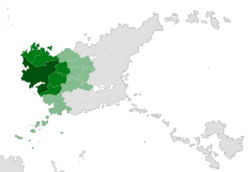Carlosian Empire
Carlosian Empire | |||||||||||
|---|---|---|---|---|---|---|---|---|---|---|---|
| 1826–1932 | |||||||||||
|
Flag | |||||||||||
 Carlosian Empire at its height, excluding possessions in Afruika | |||||||||||
| Capital and largest city | Madrigal | ||||||||||
| Official languages | |||||||||||
| Religion | Catholicism (official) Anglicanism (minority) Presbyterianism (minority) Judaism (minority) | ||||||||||
| Demonym(s) | Carlosian | ||||||||||
| Government | Unitary parliamentary semi-constitutional monarchy | ||||||||||
| Emperor | |||||||||||
• 1826–1865 | Cárlos I | ||||||||||
• 1865–1871 | Cárlos II | ||||||||||
• 1871–1889 | Marianne | ||||||||||
• 1889–1915 | Sébastien I | ||||||||||
• 1915–1932 | Sébastien II | ||||||||||
| President | |||||||||||
• 1826–1839 | Baltasár Escarcega | ||||||||||
• 1931–1932 | Jerónimo Fonseca | ||||||||||
| Historical era | New Imperialism | ||||||||||
• Established | 1826 | ||||||||||
• Disestablished | 1932 | ||||||||||
| Currency | Carlosian dero (D£) | ||||||||||
| |||||||||||
| Today part of | |||||||||||
The Carlosian Empire was a sovereign state located in Western Musgorocia. It was founded following the restoration of Carlosian independence after the Battle of Madrigal when Cárlos Mostodra proclaimed himself Cárlos I. Following the expulsion of foreign powers from Musgorocia after the conclusion of the Glorious War in 1838, Carloso, along with Barssois, became one of the dominant great powers on the continent, annexing Acrary, the former British colony of Victory and turning the neighbouring, newly independent countries of Agostinia, Orticuria, Sarabagia, Gran Laurencia and Taliaferro into client states. At the height of the Bar-Carlosian War, prior to the Treaty of Iralia in 1894, Carloso directly or indirectly controlled nearly half of Musgorocia's land area. Carloso also took control of Barssois's Afruikan colonies, encompassing modern-day Yughana, establishing the colony of Júghana, which remained under Carlosian control until 1932. Carloso also seized Port Asada, relinquishing control on the eve of the Emergency War.
Though still the dominant power in Musgorocia going into the 20th century, the Empire began to deteriorate internally during the reign of Sébastien II as tensions mounted between liberal politicians who wanted to curtail the Emperor's executive powers, far-left forces grew in strength and Acrarians demanded independence. The Red Vanguard uprising in 1919, though crushed, laid waste to much of Madrigal and dented the popularity of the monarchy. Acrary, nominally still considered part of the Empire, was given self-rule in 1921. Alarmed by the decline of the Empire, elements within the military launched a coup in 1922 led by the octogenarian Marchioness Estefania Luciana, who proclaimed herself Protecteress of the Carlosian Empire, hoping to put Sébastien II's cousin on the throne. This attempt also failed. The Empire lingered until 1932, when Sébastien II launched a coup attempt against President of the Imperial Council Jerónimo Fonseca in order thwart his plans to abolish the monarchy. Faced with the prospect of the country descending into a violent civil war, Sébastien II opted to abdicate on 29 May, abolishing the Empire. The same day, Fonseca announced the restoration of the Republic of Carloso, becoming President of the Executive Council.
Though Carloso is now a republic, the right of the descendants of the nobility at the time of the monarchy's dissolution to use their titles is recognised by law, though as titles can no longer be legally created, many have become extinct. Awards and honours granted by the Empire are also recognised. The House of Mostodra continues to act as pretenders to the Carlosian throne. An agreement between the Carlosian government under Tómas Contador and the family in 1995 returned ownership of the Imperial Palace in Madrigal and several other properties to the family, in return for guarantees that some of these would remain accessible to the public and that the Federal Republic of Carloso would be recognised as the sole legal embodiment of Carloso. Advocating for the restoration of the Empire is a relatively uncommon position in Carlosian public life, though an increasing number of politicians and other figures have advocated for it in recent years, including factions of the ruling National Salvation party.
Throughout the Empire's existence, succession to the position of Emperor operated under male-preference primogeniture.
